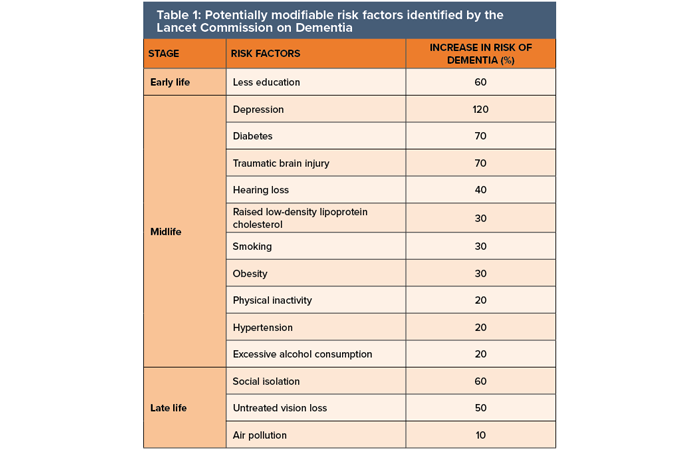In OTC
Follow this topic
Bookmark
Record learning outcomes
According to the Alzheimer’s Society, an estimated 982,000 people live with dementia in the UK. Alzheimer’s Disease (AD) accounts for 50-75 per cent of these cases. Vascular dementia, caused by the same risk factors as heart disease and strokes, accounts for up to 20 per cent. Many people have a mix of AD and vascular dementia, but there are more than 100 types of dementia.
Age is the strongest risk factor for dementia. One in 14 people older than 65 years and one in six of those older than 80 years have dementia. The Alzheimer’s Society predicts that the number of dementia patients will reach 1.4 million by 2040, partly because of the ageing population. In 2022, 19 per cent of people in the UK were aged 65 or older, which could increase to 27 per cent by 2072.
You cannot turn back time – however, you can prepare for it. The 2024 Lancet Commission on Dementia suggests that addressing 14 potentially modifiable risk factors (Table 1) could prevent almost half (45 per cent) of dementia cases. This feature looks at some recent research that suggests ways to support your patient’s cognitive wellbeing, including how to reduce the risk of dementia and Alzheimer’s.
What is cognition?
The brain is inconceivably complex. A cubic millimetre of human cortex (the brain’s outer layer), about the size of a small poppy seed, contains 16,000 nerves and 150 million synapses (connections between nerves). The average volume of a human brain is 1,350,000 cubic millimetre (1350 cubic centimetres). Dementia arises from damage to the intricate nerve networks involved in cognition.
But what is cognition? According to the American Psychological Association, cognition covers “all forms of knowing and awareness” including perception, memory, reasoning, judgment, imagination and problem solving. Alzheimer’s disease, for example, begins by undermining the higher cognitive functions such as judgement, memory and concentration.
Cognition is one of the three components traditionally said to form the mind alongside affect (mood and emotion) and conation (proactive motivation rather than habits).
Further information on diet and supplements
“More than a third of people with dementia remain undiagnosed”
An age-old issue
As mentioned, age is the strongest risk factor for dementia, and it is important to note that one’s age on paper may not reflect the age of their physical or mental wellbeing. While two 65-year-olds have the same chronological age, their underlying health (biological age) can differ markedly.
A recent study published in Neurology involved 280,918 people from the UK. Participants were aged, on average, 56.8 years at the start of the study and did not have dementia. During an average follow-up of 14 years, 4,770 people developed dementia.
The researchers assessed biological age based on lung function, blood pressure, cholesterol and other ‘biomarkers’ that show how well metabolism, immunity, liver, kidneys, heart and so on, work.
Overall, people who developed dementia had an average chronological age of 64.8 years at the start of the study compared with 56.7 years for controls who stayed free of dementia.
The average biological age of those who developed dementia was 54.6 years by a method that measured nine blood chemistry values, compared with 45.5 years for controls. People with an advanced biological age showed changes in their brain that are associated with dementia.
“These results support the hypothesis that advanced biological age may contribute to the development of dementia by causing a widespread change in brain structures,” comments study author Yacong Bo, Zhengzhou University, China. “While none of us can change our chronological age, we can influence our biological age through lifestyle factors such as diet and exercise.”
Lifestyle changes
Lifestyle changes also reduce the impact of a cluster of risk factors called the metabolic syndrome. According to charity Heart UK, one in four adults in the UK may have the metabolic syndrome, which increases the risk of diseases of the heart and blood vessels, such as heart attacks and strokes, as well as dementia.
People with metabolic syndrome have at least three of the following: excess belly fat (central obesity); high blood pressure (hypertension); high blood sugar (hyperglycaemia); high levels of the fat triglycerides; and low levels of high-density lipoprotein (HDL) cholesterol.
Another recent study in Neurology followed almost two million people between the ages of 40 and 60 years for, on average, eight years. About one in 200 developed dementia before the age of 65 years. Doctors call this early onset dementia. The researchers allowed for age, education and factors such as physical activity, depression and stroke. Metabolic syndrome increased the risk of all types of early onset dementia by 24 per cent, vascular dementia by 21 per cent and AD by 12 per cent.
Females with metabolic syndrome were at higher risk of early onset dementia than males: 34 per cent and 15 per cent respectively. Each component of the metabolic syndrome increased dementia risk and the effect was cumulative. People with all five components of the metabolic syndrome had a 70 per cent increased risk of early onset dementia.
“Our findings suggest that lifestyle changes to reduce the risk of metabolic syndrome, such as eating a healthy diet, exercising regularly, maintaining a healthy weight, quitting smoking and reducing stress, may help reduce the risk of young-onset dementia,” says study author Dr Minwoo Lee, Hallym University Sacred Heart Hospital, Anyang, South Korea.
“Future research that follows people over longer periods of time and uses brain scans to look for biomarkers of dementia is needed to confirm and expand upon our findings.”

Misplacing prescriptions, forgetting to take medication or confusion are symptoms of cognitive decline you may notice in the pharmacy, and should be referred to the pharmacist.
Mental wellbeing
Numerous conditions increase the risk of dementia and impair cognition including pain, depression, anxiety, Parkinson’s disease, stroke, sleep apnoea, hypertension, heart failure, atrial fibrillation (a type of abnormal heartbeat), chronic kidney disease and type 2 diabetes. Indeed, diabetes seems to roughly double the likelihood of impaired cognition, which can mean, for example, that people forget to take their treatment or are unable to measure blood glucose. In other patients, impaired cognition may mean that people are unable to use an inhaler properly or record their blood pressure.
So, ask patients (and, if appropriate, caregivers) if they experience such difficulties and ensure they appreciate the importance of taking their medications as prescribed.
Depression showed the greatest increase in dementia risk of the 14 factors identified by the Lancet Commission on Dementia (Table 1). Depression undermines several aspects of cognition, including attention, memory, information processing, decision-making, cognitive flexibility (adapting to changing circumstances) and executive functioning (planning and working towards goals).
Unfortunately, some people report that antidepressants cause a ‘mental fog’. Other widely used medications that can undermine cognition include certain antihistamines and hypnotics that cause sedation; opioids; and anticholinergic drugs. But, as mentioned, depression can impair cognition. If you think a drug may be impairing a patient, speak to the pharmacist. Effective management of the drugs, the disease, or both, can improve cognition.

Engaging with others and feeling connected to a community is an important prevention measure against cognitive decline, so be sure to encourage socialising amongst your older customers.
Mental wellbeing: the state of the nation
Alzheimer’s disease and mental health issues are common. According to the Alzheimer’s Society, an estimated 982,000 people live with dementia in the UK. More than a third of people with dementia remain undiagnosed. Moreover, 21 million people in England have a close friend or family member living with dementia. As women live longer than men, 62 per cent of people with dementia are female.
According to the National Study of Health and Wellbeing (also called the Adult Psychiatric Morbidity Survey), the number of people with common mental disorders has increased steadily since the first survey in 1993. The survey runs every seven years and results from 2023 are expected in June. See: digital.nhs.uk/data-and-information/publications/statistical/adult-psychiatric-morbidity-survey.
About 20 per cent of children aged seven to 16 had a probable mental health issue in 2023, an increase from 12 per cent in 2017, according to NHS figures. During 2022-23, 3.58 million people accessed NHS mental health, learning disability and autism services.
The ABC of mental wellbeing
Since 2008, a ‘social marketing’ campaign in Western Australia aimed to improve the population’s mental wellbeing. The campaign promoted an ‘ABC’ approach:
- Act: Keep alert and engaged; keep mentally, socially, spiritually and physically active
- Belong: Develop a strong sense of belonging; keep up friendships, join groups and participate in community activities
- Commit: Do things that provide meaning and purpose in life including taking up challenges, supporting causes and helping others.
A recent study assessing the ABC approach, published in the journal SSM Mental Health, included 603 adults, 93 per cent of whom reported no mental distress. The researchers measured wellbeing using a scale called WEMWBS-14. Scores range from 14-70, with higher scores indicating better mental wellbeing.
The average score at the start of the study was 52.6 points. People who chatted with other people one to six times a week and daily scored 5.8 and 10 points higher on the WEMWBS-14 than those who chatted less than weekly. Spending time in nature one to six times a week and daily were associated with increases of 3 and 5.1 points respectively. Frequent meetings with friends, physical activity, practising spirituality, religion having a large influence on life, activities that need thought and concentration, and helping others also improved mental wellbeing.
“Regular connection with others, even a daily chat, can make a measurable difference to how people feel. Similarly, spending time outdoors or doing something that requires thinking and concentrating like doing crosswords, reading or learning a new language provides an important mental reset,” concludes study author professor Christina Pollard, School of Population Health, Curtin University, Perth, Australia.
“This research confirms that when people are supported and encouraged to engage in mentally healthy behaviours, the benefits can be felt across the community. It’s about prevention, not just treatment – helping people stay mentally well before they reach crisis point.”
“While none of us can change our chronological age, we can influence our biological age through lifestyle factors such as diet and exercise”
Supplementing mental wellbeing
Age UK suggests eating a healthy diet that is low in sugar and includes five portions of fruit (particularly berries) and vegetables a day. Older people, however, may absorb some nutrients, including vitamin B12, vitamin B9 (called folate and folic acid in its natural and synthetic forms respectably), calcium and iron, less effectively than their younger counterparts. For example, the stomach produces less acid and the activity of enzymes in the gut decline as we age.
Older people with low to normal levels of vitamin B12 showed more rapid age-related brain shrinkage than those with higher levels, notes Age UK. However, the amount of folate and B12 needed to overcome this reduced absorption may be more than that in a regular multivitamin. You could suggest people eat a breakfast cereal fortified with folate and B12.
In people with mild cognitive impairment, a mix of folic acid, vitamins B6 and B12 reduced the rate of brain shrinkage and cognitive decline. Age UK suggests that people older than 50 years should consider fish oil and vitamins B12 and D supplements.
Certain drugs (e.g. metformin and proton pump inhibitors) can reduce absorption of vitamin B12. So, ask what medicines the patient is taking and, if necessary, speak to the pharmacist.
Vitamin D protects the brain as well as bones, teeth and muscles. The Government advises that everyone should take a daily vitamin D supplement (10 micrograms for children older than one year and adults) from October to early March.
People at high-risk of not getting enough vitamin D (e.g. frail or housebound people and those with dark skin who cover up while outside), children aged one to four years, and babies younger than one year – unless they’re having more than 500ml of infant formula a day – should take a daily supplement throughout the year.
Age UK suggest a higher dose for adults to protect the brain: 20-40 micrograms. Speak to the pharmacist if you are unsure about which vitamin D or another supplement to suggest.
Eating fish, especially oily fish (e.g. salmon, mackerel, herring and fresh tuna), contain omega-3 polyunsaturated fatty acids, which may protect the brain from shrinking and cognitive decline, and enhance B vitamins’ benefits.
Age UK suggest eating fish at least once a week. Most people need to take between 1-2g of omega-3 fatty acids from fish oil capsules per day. Vegetarian and vegan omega-3 supplements are available.

Customers can get their omega-3s through their diet, or by supplementing with fish oil capsules.


